She had found a jewel down inside herself and she had wanted to walk where people could see her and gleam it around. But she had been set in the market-place to sell. Been set for still-bait. When God had made The Man, he made him out of stuff that sung all the time and glittered all over. Then after that some angels got jealous and chopped him into millions of pieces, but still he glittered and hummed. So they beat him down to nothing but sparks but each little spark had a shine and a song. So they covered each on over with mud. And the lonesomeness in the sparks make them hunt for one another, but the mud is deaf and dumb. Like all the other tumbling mud-ball, Janie had tried to show her shine.
Zora Neale Hurston
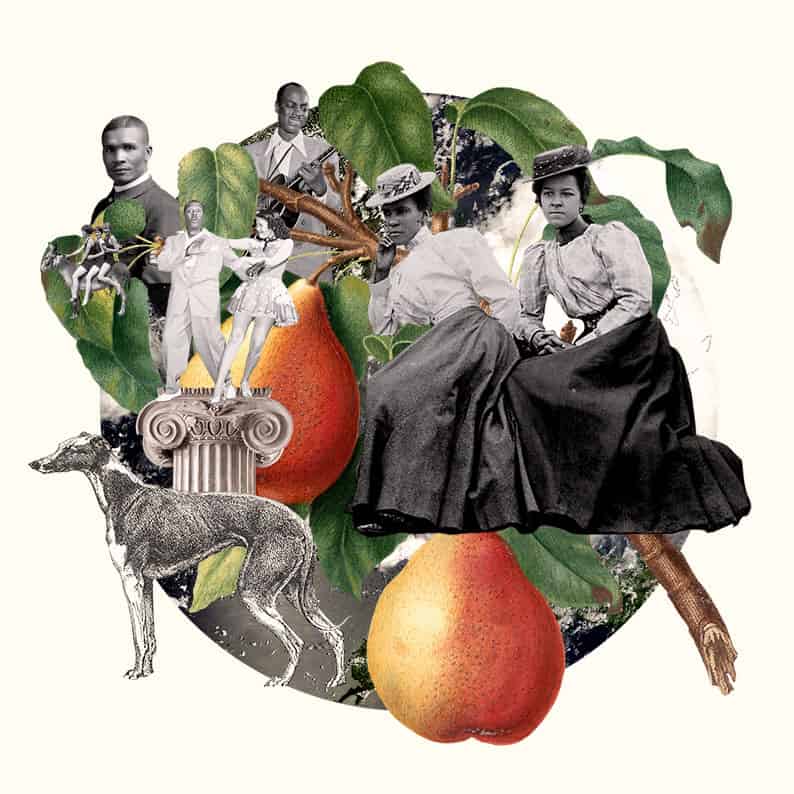
Their Eyes Were Watching God
Zora Neale Hurston
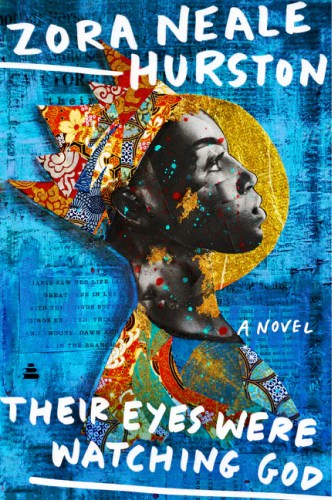
Hurston, Zora Neale. Their Eyes Were Watching God. Amistad (an imprint of Harper Collins)
"Their Eyes Were Watching God" is about the power of finding your voice, your selfhood, your womanhood.
It is the story of Janie Crawford, abandoned by her mother and raised by her grandmother who warned her that women are “the mules of the world.” Married off at the age of [sixteen] because her grandmother is afraid of the choices Janie might make if given the opportunity. In a split second decision Janie leaves her husband for the first man who shows real interest in her, turning her back on a loveless marriage. This new marriage is profitable with her new husband becoming the mayor of a newfound community. Janie has money, comfort, and a man, all the things her grandmother wanted for her. And Janie believes she is happy for a minute. But soon even that marriage, one she believes she’s chosen for herself, comes undone. Her husband becomes jealous, arrogant, and controlling, taking the joy out of even the smallest of pleasures within the community. When he falls ill, he refuses to allow Janie to tend to him, and eventually he dies. Janie is finally able to live life on her own terms, which is all she’s ever wanted in the first place. In the process, she meets the younger, handsome Tea Cake. By all accounts, Tea Cake isn’t the kind of man a woman of Janie’s stature and means should want to be with, but she loves him. For the first time, she has chosen a man because she wants him, not because he wants her, though Tea Cake does want her.
Together they move to Florida and eke out a living despite Janie’s relative wealth. He takes her to the cane fields where she works alongside him. When a hurricane blows through their farming community Tea Cake is bitten by a rabid dog and develops a fatal case of rabies. In a cruel turn of fate, Janie must kill the only man she has ever loved. The community which she had to come regard as a home turns on her as she stands trial and is found not guilty of Tea Cake’s murder. Janie buries Tea Cake and goes back to the small town, content that she has lived the life she was meant to live.
Why This Text is Transformative?
In this era of the “authentic self”, this novel is a virtual user’s manual for that very thing.
Their Eyes Were Watching God is an epic feminist manifesto. But it also appeals to anyone who is in search of who they are. In this era of the “authentic self”, this novel is a virtual user’s manual for that very thing. Men and women will connect to Janie’s quest for an authentic self and for the ability to make her own choices.
A Focused Selection
Study Questions
Chapters 1, 2, 4, 5, & 7
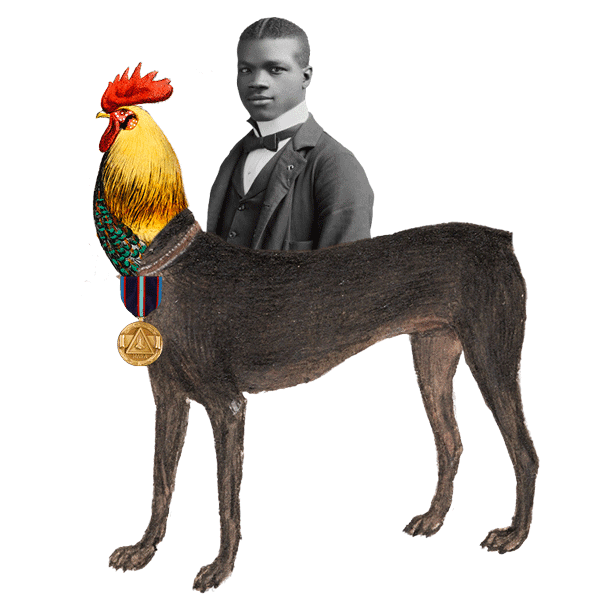
The following selections from the text will create a lively discussion of contemporary themes
Chapters 1, 2, 4, 5, and 7
These chapters introduce to Janie’s history and bring us to her first two marriages. We learn that she has arrived home from burying her third husband. Janie begins to tell her story to her friend who has come to bring her food. She begins at the beginning where she grew up on the land of the Washburn’s where her grandmother was the cleaning lady. She tells the story of how she had no idea she was Black until she saw a picture of herself. And then her grandmother, in a fit of fear and anxiety that her granddaughter would turn out like her daughter (Janie’s mother), marries her off to Logan Killicks, a landed Black man who can make Janie “respectable”, which is all her grandmother wants. But Janie doesn’t love Logan. And the love she expects to come down after the marriage never comes, so at her first opportunity she leaves with a man who excites her, Joe Starks. Starks is a man of means. And soon he is the center of the small town he went to Florida to build. And Janie, by extension, is also important. Soon, this marriage sours and Janie decides to take up for herself.
Class 1 – Study Questions
1) Janie’s grandmother has very practical reasons for wanting her to marry Logan. Janie, though believes in love for its own sake. Is it better to marry for love or for more practical reasons?
2) The story begins with Janie returning from her travels and burying her husband. The women of the town are watching and waiting and talking. Do you or did you ever have a friend like Phoeby? How important is it to have friends like that?
3) Janie’s relationship with Tea Cake is cause for much gossip. He’s younger than she is, and he brings nothing financial to the table. Nobody can see what she sees in him. Have you ever been in a relationship like that? Was it a good relationship despite what others thought?
Chapters 10, 11, 14, 18, & 19
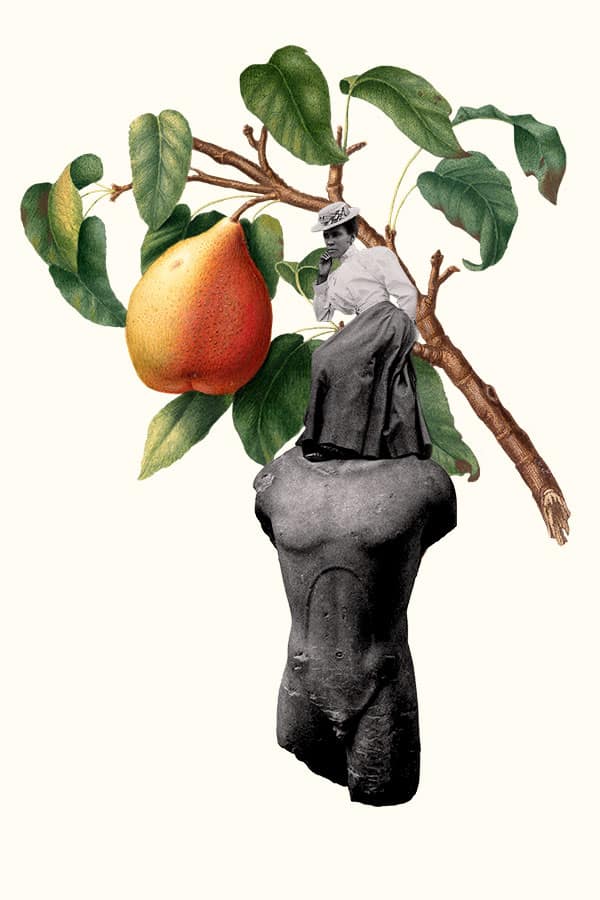
Chapters 10, 11, 14, 18, and 19
These chapters bring us to Janie and Tea Cake. After Janie fights back with her words against Joe’s insults, he grows sick and eventually dies. Virgible Tea Cake Woods comes to town and Janie is immediately smitten with the way he talks to her. For the first time in her life she feels seen and heard by a man. Joe has left her well off and she still runs the store as she did before he died. Tea Cake convinces her to move to the Everglades with him and work the fields, a request her friend Phoeby warns her against doing. But Janie goes anyway. For the first time in the novel Janie is happily married. But during the off season a hurricane arrives and along with it a rabid dog which bites Tea Cake. Without the proper medical care he, too, becomes rabid, and Janie must shoot him to save herself. She is tried and acquitted of the murder, but her friends have turned against her until she puts up the money for Tea Cakes burial. Then she returns home to finally pull her horizon in close.
Class 2 -Study Questions
1) Janie’s relationship with Tea Cake is cause for much gossip. He’s younger than she is, and he brings nothing financial to the table. Nobody can see what she sees in him. Have you ever been in a relationship like that? Was it a good relationship despite what others thought?
2) Janie gives up everything she worked for in Eatonville to go and be with Tea Cake and tells Phoeby she’d still be there if Tea Cake hadn’t died. Janie clearly feels that her sacrifice was worth it. Can you imagine making that kind of sacrifice to be with someone you love?
3) At the end of the novel, Phoeby says, “Lawd, Ah done growed ten feet higher from jus’ listenin’ tuh you, Janie. Ah ain’t satisfied wid mahself no mo…” Who inspires you? And why?
Building Bridges
A Recommended Pairing
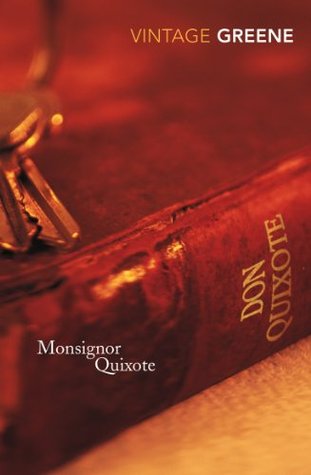
A wonderful short novel by Graham Greene, Monseigneur Quixote, recasts Cervantes’ magnum opus in a way that captures much of the humor and pathos in a more modern context, as the adventures of a Roman Catholic priest and a communist mayor taking to the road together in Spain during the Franco years. The richly imagined characters and their conversations make it clear that the issues that drive Don Quixote’s idealistic quest are not raised only in books of chivalry. How do we live with a commitment to the ideals of a religious faith or a political ideology which, though noble, may not fit easily with and may have unfortunate consequences in the unforgiving world in which we find ourselves? What difference does friendship make in our lives?
Supplemental Resources
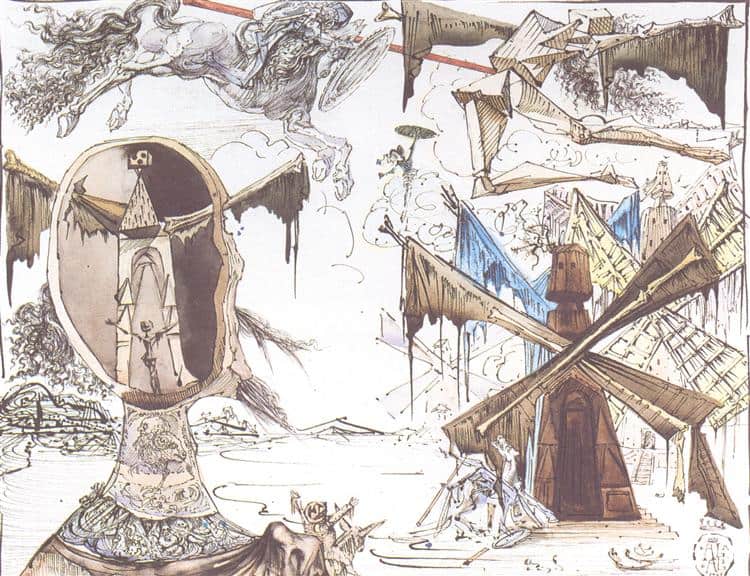
Don Quixote and the Windmills, 1945 - Salvador Dali - WikiArt.org
Don Quixote has been an inspiration for many visual artists. Spanish surrealist Salvador Dali returned to the novel multiple times throughout his long career, creating sketches, paintings, and sculptures of Don Quixote and Sancho, depicting important episodes in the book. A pairing of an episode with one of Dali’s works can lead to a stimulating discussion.
What details do students notice? What do his artistic choices suggest about his interpretation of the characters? To the extent that students are familiar with the story of Don Quixote, it is likely to be as it is filtered through the musical The Man of La Mancha. The musical has its own merits, and is framed by the interesting device of placing Cervantes on stage as a narrator, but of course it is impossible for it to capture much of the complexity of the book – and it alters the ending dramatically. Students may find it interesting to compare the two endings.
Text Mapping
Discipline Mapping
English/Composition Studies
Humanities
Area Studies
Page Contributor



